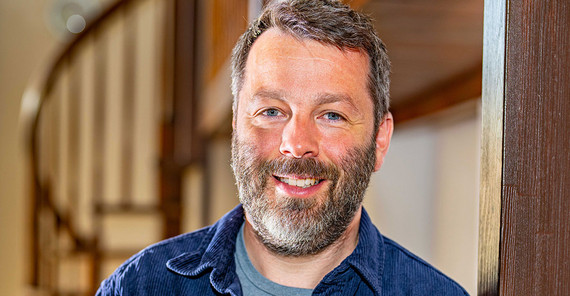“That’s already a success,” says the 42-year-old. The aim of the professorship is to promote individuals rather than projects. “When I applied, I had to show whether I had the potential for a professorship, i.e., that I had already acquired third-party funding, published as a senior author, and established collaborations.”
Prof. Kleinert has been head of the Department of Molecular Physiology of Exercise and Nutrition at the German Institute of Human Nutrition Potsdam-Rehbrücke (DIfE) since 2021. The DIfE and the University of Potsdam both benefit from funding totaling more than 600,000 euros: “The Heisenberg Professorship is not only renowned. It also finances my professorship for the first five years.” Part of the funding is also earmarked for material resources.
Research to combat diabetes
Kleinert will now continue researching what has long interested him: How can human muscles be influenced to reduce the risk of developing diabetes – or to suppress the progression of the disease?
The scientist, who lives with his family in Berlin, wants to focus on three aspects: On the one hand, the health-promoting aspect of exercise, relevant for type 2 diabetics. “Muscle is one of the main organs that store blood glucose,” he explains. “Among other things, diabetics cannot absorb enough blood sugar with their muscles, so the level in the blood is too high.” But if they exercise, the muscle can absorb sugar completely normally. “It is exciting to understand how this works at the signal level and which proteins are involved. We believe that some signaling pathways are hidden that we could also pharmacologically activate in the long term."
On the other hand, Kleinert is investigating the role of nutrition, or more specifically medium-chain fatty acids. “They are usually not very present in food, but if we add these acids, they could have a health-promoting effect.” And last but not least, the aim is to use new methods to activate certain genes in the muscle so that it absorbs glucose better. “All in all, we are trying to achieve weight-reducing effects because diabetics often struggle with obesity.”
In his research, he uses various methods to get to the bottom of the effects of exercise. At the Potsdam Institute, measurements are taken on mice running on a treadmill or running wheel. “Mice voluntarily run almost ten kilometers a day – which is incredible given the size of the animal.” In Copenhagen and Munich, where he previously worked, the focus was on human experiments: “People had to cycle, and we took muscle biopsies.”
From Berlin to Austin and back
Sport played a major role for the researcher from an early age. Born in Berlin, he attended a sports high school in Köpenick, played soccer and went on a student exchange to Austin, Texas, for a year. He went there again for his studies. “Austin is a liberal university city with almost 100,000 students.” After completing his bachelor’s degree in kinesiology, i.e., exercise and sport, he promptly pursued a master’s degree in exercise physiology – and investigated glucose, which is stored as glycogen in the muscle and provides energy for athletes. “The master’s degree was my first conscious, adult decision.”
After graduating, Kleinert wanted to return to Europe to be closer to his family and earned his doctorate at the University of Copenhagen. “The focus there was similar to that in Austin,” he says in retrospect. “For metabolic research, Copenhagen is a dream. One reason for this is a large pharmaceutical company based there, which was one of the first to produce insulin for use in patients in the 1920s and has been investing in metabolic research for decades."
His further career steps were also associated with “exciting questions”. In 2017, Kleinert moved to the German Research Center for Environmental Health at Helmholtz Munich. He investigated new pharmacotherapies for the so-called metabolic syndrome, i.e., high blood pressure, obesity, and sugar and lipid metabolism disorders. In 2021, he then went to DIfE.
Inspiring students for research
“I have always organized my research myself with third-party funding,” he says. “I am proud of that, but it was also stressful.” Now the navigating from project to project could come to an end, he hopes. The Heisenberg professorship, after all, obliges his Potsdam institute to examine whether the professorship can be made permanent after five years. However, fundraising continues – not for him, but for his staff. “I am now responsible for doctoral students, postdocs, and master’s students."
Over the coming weeks, he plans to draft his lectures. “I have quite a bit of respect for that,” he admits. “I’ve taken over individual lectures before and realized how much time they take to prepare.” Teaching and explaining something to others is quite different from understanding something rudimentarily yourself. “But it’s also fun to think everything through down to the last detail. The university also offers a good platform for attracting students to one’s own research.”
Further information on the Heisenberg Professorship
https://www.dfg.de/de/foerderung/foerdermoeglichkeiten/programme/einzelfoerderung/heisenberg
Further information on Prizes and Awards
https://www.uni-potsdam.de/de/up-entdecken/upaktuell/personalia/preise-und-ehrungen
Maximilian Kleinert studied kinesiology and sports physiology in Austin (USA). Since 2024, he has been Heisenberg Professor in Potsdam.


